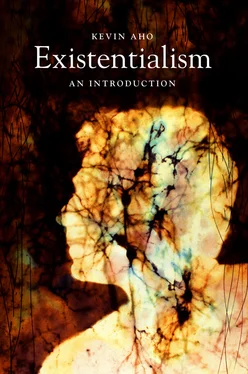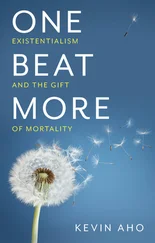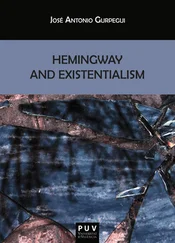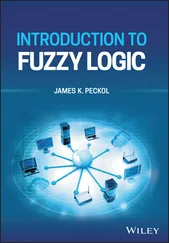Because existence itself is the source of the crisis, existential anxiety should not be displaced or repressed. It should be fully experienced and accepted so that the patient can learn from it and become aware of who he or she is. Psychiatrists, of course, generally avoid this kind of exercise in self-awareness not only because it is discomfiting to them but also because it would aggravate the patient's already unstable condition. Their aim as medical professionals is to turn the inchoate experience of anxiety into something objective that can be managed and controlled, if not eliminated altogether. But the existential therapist knows that this is impossible because anxiety belongs to the human situation. As Paul Tillich writes, all “attempts to transform anxiety into fear are in vain. The basic anxiety, the anxiety of a finite being about the threat of nonbeing, cannot be eliminated. It belongs to existence itself” (2005, 333). Unless there is a genuine confrontation with one's own nothingness, anxiety will continue to emerge again and again, often with greater degrees of intensity. So, instead of defensively recoiling from the experience or trying to blunt it with medication, the aim of therapy is to “plunge into the roots of one's anxiety, for a period of time , experiencing heightened anxiousness” (Yalom 1980, 206). In the safety of a clinical setting, the therapist would encourage the patient to invite anxiety to come forth and dwell in it so that he or she can feel it, recognize it, and come to grips with its sources. It is only then that anxiety begins to lose its terrible power because the patient learns how to confront and integrate anxiety and death into everyday life. This is why Kierkegaard claims that “only that man who has gone through the anxiety of possibility is educated to have no anxiety ” (1944, 141, my emphasis). In this case, the patient becomes aware that the world is fundamentally insecure and that he or she is not and has never been an enduring and substantial thing. With this acceptance the patient can be opened up to ways of living that are no longer mired in the neurotic and self-deceptive need for control and certainty, and life takes on a transformative sense of urgency, poignancy, and depth that was missing before the confrontation. Tolstoy's The Death of Ivan Ilych offers the classic example of this kind of transformation.
Absorbed in the trivialities of everyday life, Ivan has a strong sense of ontological security. He has normal fears about money, vocational success, and social appearance, but because these fears are of something they can be easily managed. It is not until he is stricken with the possibility of his own annihilation from a terminal illness that his world begins to collapse. Initially, Ivan can't face the fact that he himself is the source of his anxiety, referring to his impending death as ‘ It ,’ as if it were an object that was separate and distinct from him. “ It would come and stand before him and look at him,” writes Tolstoy, “and he would be petrified and the light would die out of his eyes, and he would again begin asking himself whether It alone was true” (1960, 133). But his anxiety persists, and the more he denies and represses it the more intense it becomes, eventually swallowing him completely. “From that moment the screaming began that continued for three days and was so terrible that one could not hear it … without horror” (154). Experiencing the full force of anxiety, Ivan's identity as a judge, a husband, and a father is destroyed, yet in this dissolution he suddenly realizes, “Maybe I did not live as I ought to have done” (148). This is the power of the existential crisis. It shakes us out of the false security of everyday life and makes us stand before the ultimate questions: ‘ Who am I ?’ and ‘ How should I live ?’ In his last moments, Ivan finally accepts his death and is transformed. He is flooded with an awareness of the poignancy and fleetingness of life and of the depth of his feelings for his wife and children. Tolstoy's story reveals that anxiety is a threat to existence because it shatters the meanings that hold our identity together. But it also opens up possibilities for existential growth and change by revealing who we are as vulnerable and finite beings and by forcing us to confront the self-defining choices and actions that made us who we are.
From this discussion, we see that existential therapy is not a scientific or technical procedure that seeks to eradicate anxiety. The aim, rather, is to understand the human situation, to bring to the surface fundamental experiences and questions of being human, and to free the patient from self-deception by accepting and integrating anxiety and death into life. The scientific framework of medical psychiatry cannot address these kinds of concerns because it fails to see the patient from the perspective of existence. This raises the question of whether or not existential therapy is opposed to any kind of medical intervention that objectifies and dehumanizes the patient, even if these interventions would protect the patient from self-harm or from hurting others. From a clinician's standpoint, is it naïve or even dangerous to encourage existential anxiety to come forth?
Is existentialism anti-psychiatry?
Although its philosophical roots can be traced back to Kierkegaard and Nietzsche in the nineteenth century, the acceptance of an existential approach as an alternative to the medical model in psychiatry is a more recent development. Austrian psychoanalyst Otto Rank (1884–1939) first began to incorporate existential interpretations of selfhood and anxiety in his clinical practice after breaking with Freud in the late 1920s. And Rank's contemporaries in Switzerland, Ludwig Binswanger and Medard Boss, drew on Heidegger's conception of Dasein to pioneer new forms of treatment in the 1940s and 1950s by framing the nature of psychopathology, not in terms of biological dysfunctions or unconscious Oedipal conflicts, but in terms of the structural breakdown of being-in-the-world (May 1958a). And, in the United States, clinicians such as Rollo May and Irvin Yalom played a similar role in applying the insights of existentialism to psychotherapy. But it was in Britain in 1960s and 1970s that existential therapy gained the most widespread acceptance among mental health professionals, largely through the work of psychiatrists such as David Cooper (1931–1986) and R. D. Laing. The reenvisioning of psychiatry offered by Cooper and Laing resonated with the anti-authoritarian ideals of the 1960s by challenging prevailing psychiatric practices, where the patient was diagnosed and labeled as ‘insane,’ controlled with drugs and/or electroconvulsive therapy, or hospitalized against his or her will. These practices, famously satirized in Ken Kesey's One Flew over the Cuckoo's Nest (1962), were criticized for representing the attitudes of an overly rationalized and repressive society, where any behavior that broke with the status quo was considered a threat to the social order, and psychiatrists were viewed as enforcers of the order in the same way police or prison guards were. Indeed, on their view, mental illness was seen as a ‘healthy’ reaction to these dehumanizing social conditions (Kennard 1998, 104).
In response to these conditions, Cooper and Laing established a new kind of therapeutic community where the aim was not to label, objectify, and control patients, but to understand them as people, relating to their existential situation and giving them a safe space to confront their anxiety and discover who they were. In these communities, residents were not diagnosed as ‘mentally ill’ but given freedom to participate in community activities as they saw fit. Staff and residents were regarded as equals, and medications were largely unavailable. Although a number of communities were established in the 1960s, the most famous and controversial was Kingsley Hall in London. A psychiatrist who lived and worked there described the conditions in the following way:
Читать дальше












